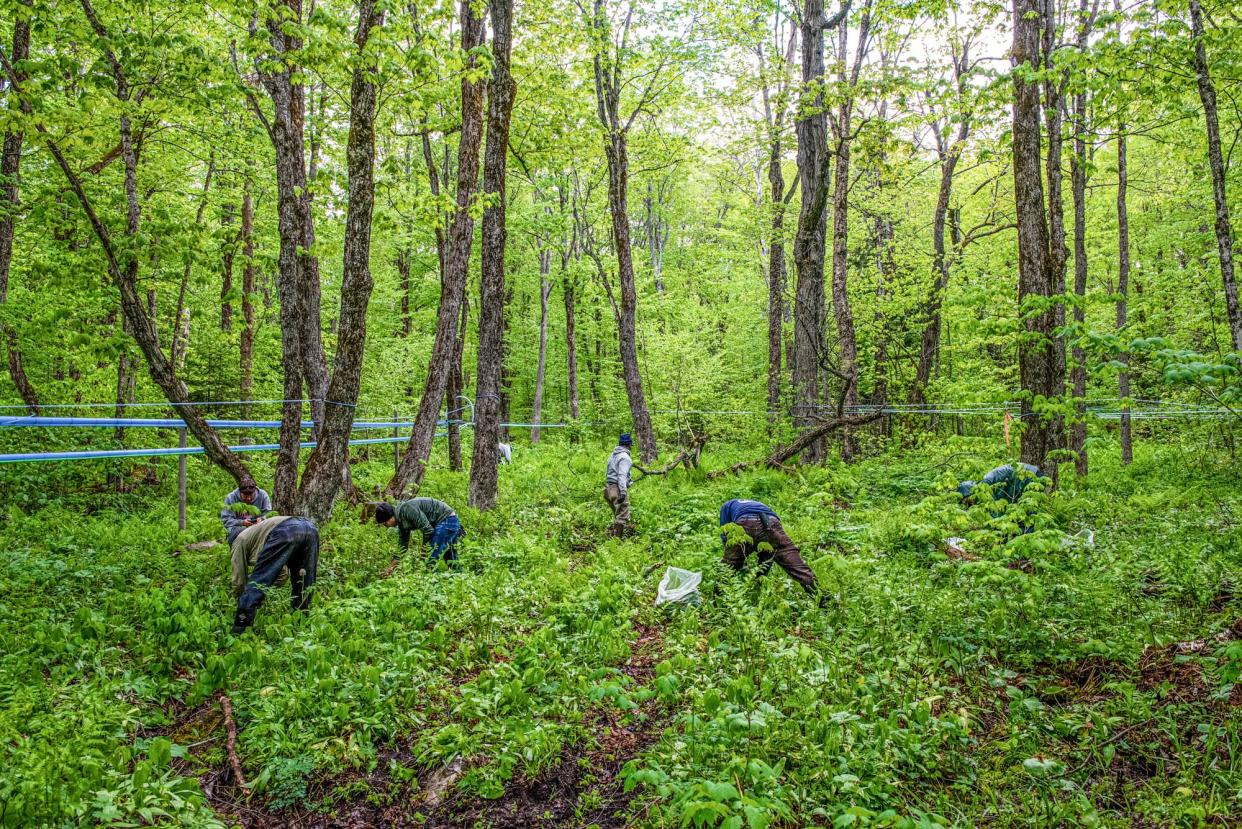Meet the People Who Pick Those Ramps You Love So Much

Max Falkowitz
The Walmart in Plattsburgh, New York, is a far cry from the fish markets of Montego Bay, but 1,800 miles from home, Omar Thelwell is game to use what he has. Fish tea—a delicate Jamaican broth of fish and simmered vegetables—is a versatile dish, and if all you have is frozen tilapia, that's just fine.
"At home I can choose my own fish, like snapper and parrot-fish, and get real onions, scallions, and spices," Thelwell says in his mellifluous voice, over a WhatsApp call from his house in Jamaica. "In New York, we may not get what we wanted, but we work with it." Plattsburgh may not have a dozen varieties of freshly caught fish, but it does have one ingredient you're unlikely to find in Jamaica: ramps. And as Thelwell discovered last spring, ramps make for excellent fish tea.
READ: 10 Ways to Use Ramps
Thelwell and a small crew of Jamaican men have spent several months of each of the past five years doing farm work in upper New York state, just a holler shy of the Canadian border. For most of that time, they picked apples in the town of Peru, but last year, they spent three months in the employ of New Leaf Tree Syrups, working in maple and birch forests in Lyon Mountain and nearby Vermont. In March, that meant trudging through two to three feet of snow to lay tap lines across trees. Come May, Thelwell and his crew shifted to foraging for the darling of Northeast springtime produce: ramps. New Leaf can make as much as $8 per pound wholesale for the pleasingly stinky alliums, also called wild leeks, and after months of bitter cold and pantry meals, the young greens add some much-needed color to the kitchen Thelwell shared with the other workers in company housing. When incorporated into a pot of fish tea, they bring a welcome taste of home.
READ: 16 Chefs on Their Favorite Ways to Cook Ramps
Fish tea is meant to be light, Thelwell explains. That's why it's called "tea." The cooking method is tealike, too, beginning with a pot of boiling water and ending with a fragrant decoction of whatever fish and produce is available. He debones and then poaches the fish with the vegetables, which might include pumpkin, corn on the cob, carrots, and dasheen (taro). "The pumpkin, it melts in, gives the soup body." The same goes for rolled knobs of dumpling dough, made from flour and cornmeal with a bit of water. Add some onion, scallion, and Grace brand flavored soup mix, and baby, you've got a soup going. "Grace, that stuff is magic," Thelwell says with an audible grin. He's talking about the powdered bouillon ubiquitous in Jamaican kitchens. "I don't know anybody who doesn't use it."
Absent the pristine scallions, herbs, and spices he'd use in Jamaica, Thelwell makes do. A nearby Jamaican farmer supplies his crew with fresh carrots and packets of Grace. Last year, Thelwell learned that springtime ramps still glowing from the afternoon sun make all the difference. "They're the last thing I'll put in the pot," he says. "I don't want the flavor to be boiled away."
Thelwell owes his lesson in ramp cookery to Dan Tanski, New Leaf's sugar-bush manager who also manages the harvesting crew. "Dan is a real bushman," Thelwell says with a laugh. "He introduced us to all these foods. I don't even know their names." For a nutritional jolt on cold New York mornings, Dan showed the guys a tea he makes with ramp leaves, balsam tips, and a glug of maple syrup. There's no analog in Jamaica, but Thelwell is a fan.
Read: Meet Evan the Forager, the Man Providing NYC's Top Restaurants with Wild and Rare Ingredients
Ramps can be big business in New York, and it takes skill to work with them. You have to know which ramps are mature enough to harvest, as well as the inscrutable leaf hues to avoid that may signal disease. You also need to be savvy to the landscape to root out fresh patches and harvest just enough to make sure the ramps return next year. Most of the guest workers in Thelwell's group are farmers with their own land in Jamaica. Thelwell has run his own carpentry business for 25 years, "but those guys," he says of his coworkers, "they're real farmers. They have expertise in all kinds of crops."
In a remote place like Lyon Mountain, New Leaf's cofounder Michael Farrell says it's tough to find locals to do the hard work of laying tap lines and collecting ramps. If all goes well, Thelwell and his peers should be back in the forest come springtime, their chatter echoing against the soaring maple trees, and their soup pots perfumed with ramps for another year.

